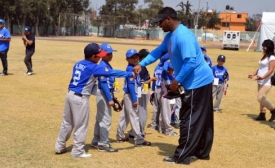exchange diplomacy
In a speech to Peking University students yesterday, US first lady Michelle Obama defended freedom of expression and other "universal rights" - sensitive concepts that mainland university professors were banned from teaching a year ago. The remarks - the closest the first lady has so far come to discussing politics during her China visit - came during an otherwise soft speech in which she encouraged students to study abroad and cited her own success as a testament to hard work.
For the past three years, the Sound Central Music Festival drew artistic talent from across Afghanistan, featuring music, dance and art. But not this year. On April 5, Afghans will head to the polls to vote for a new president from a slate of 10 candidates. The situation is a bit uneasy right now, so it’s not the best time for a full-on music festival. So one of the festival’s organizers came up with another idea.
It’s the smallest and most obvious thing, and yet my life was at stake: I had to learn to look to the right when crossing the street. That’s my first memory when I think back on the exchange program I attended in the United Kingdom as a junior in college. Like everyone who takes the big jump into studying abroad, I was immersed in a different culture full of new people, foods, and sounds.

While successful people-to-people diplomacy always requires hard work and creativity, a little star power never hurts. So when recently-retired Major League Baseball great Ken Griffey, Jr. joined 2004 Olympic softball gold medalist Natasha Watley to serve as State Department sports envoys for “Diamond Diplomacy” activities in Mexico City from February 28 to March 4, the program was destined to sparkle.
It has had its fair share of social media scandals and been accused of buying fake Facebook likes, but the White House believes the benefits of being an active participant in the uncertain world of social media still far outweigh the risks. It calls it digital diplomacy.
I received a letter from the U.S. State Department last week. It was from a program officer in the office of International Visitors thanking me for hosting three Chinese journalists who were visiting the United States as part of the State Department’s Edward R. Murrow exchange program. It was a very nice thank-you note. The last line read: “Your generosity and kindness made a lasting, positive impression, helping advance the cause of America’s public diplomacy effort.”
Even after a long flight and jet lag, 11 female, Iraqi athletes and three coaches arrived to the United States this December bright-eyed and ready for an empowering experience. They were eager to listen, ask questions, and talk about their backgrounds as teenage soccer players and students in Iraq. Although most of the young women met for the first time at the airport, coming from three different cities -- Baghdad, Kirkuk, and Erbil -- they already acted like teammates.
Often, those of us who study public diplomacy forget about the hard work put forth daily by thousands of U.S. volunteers working as citizen diplomats. The activities of organizations such as Sister Cities International and the National Council for International Visitors not to mention the Fulbright Scholar Exchanges, are great examples of citizen diplomacy in action across America every day.







